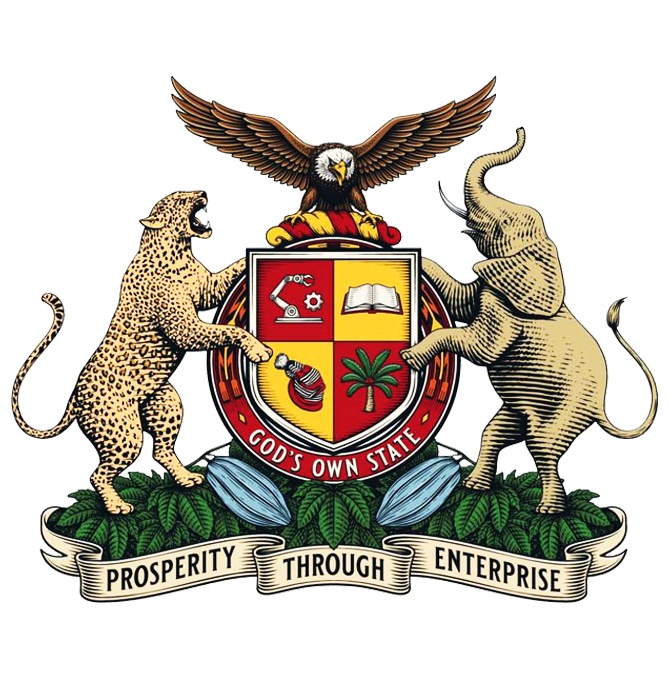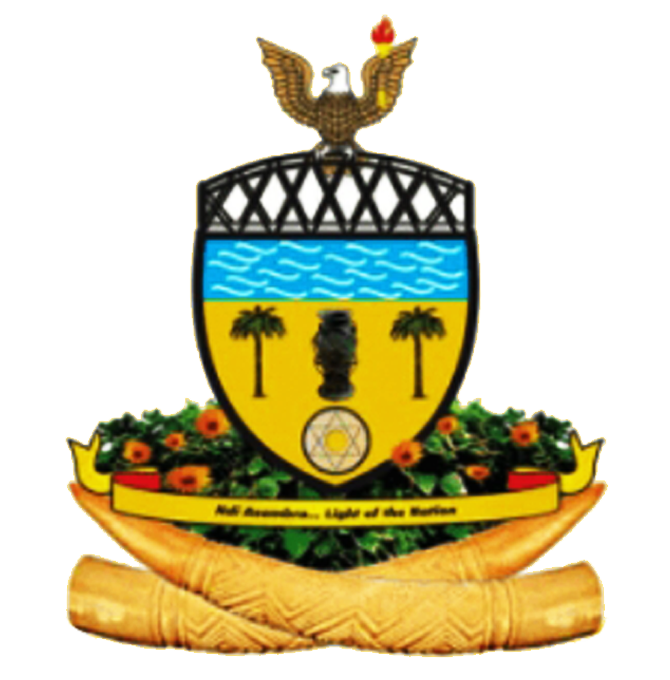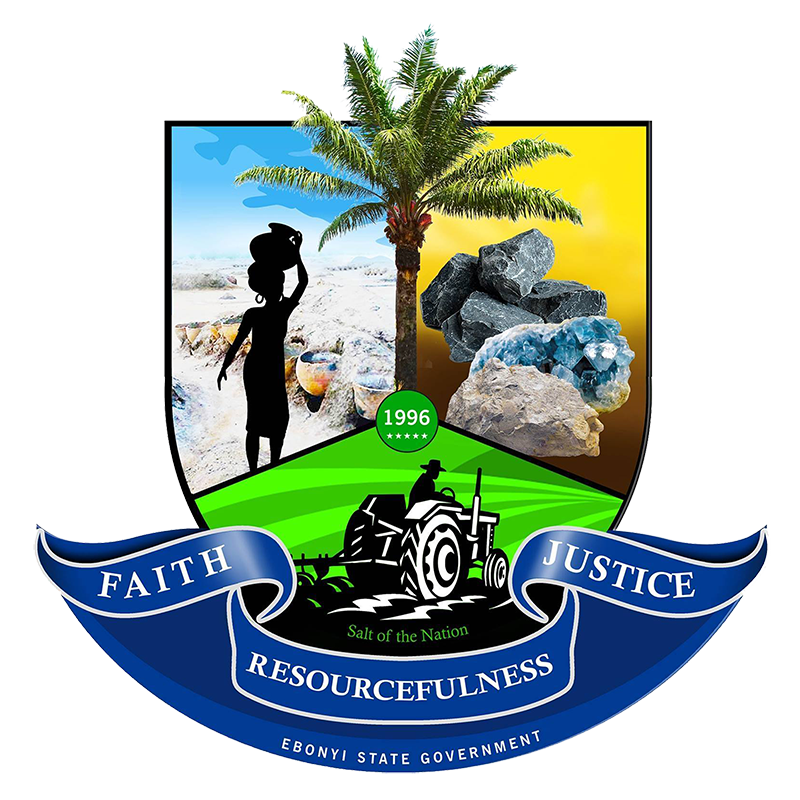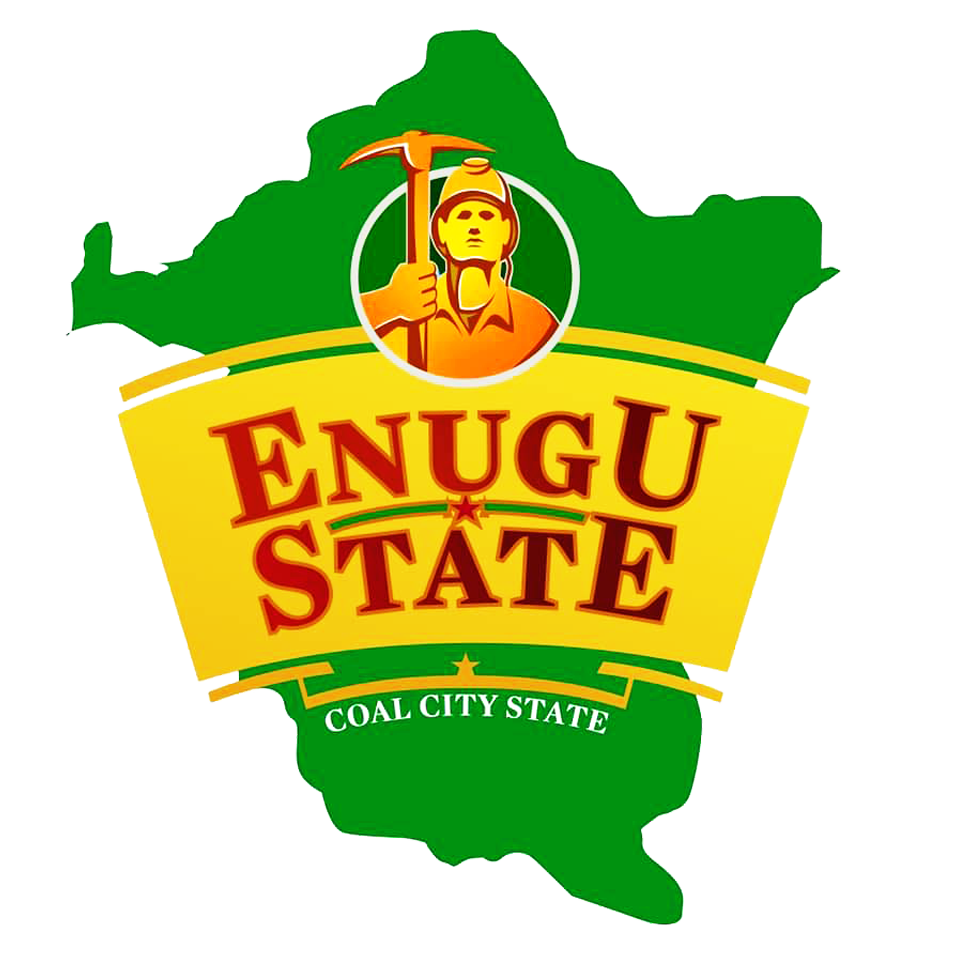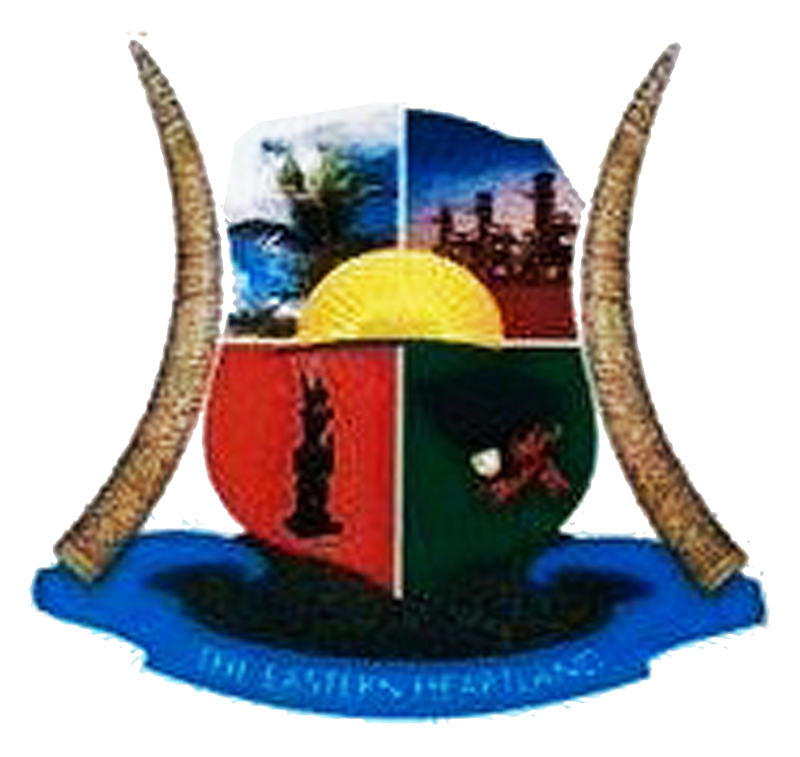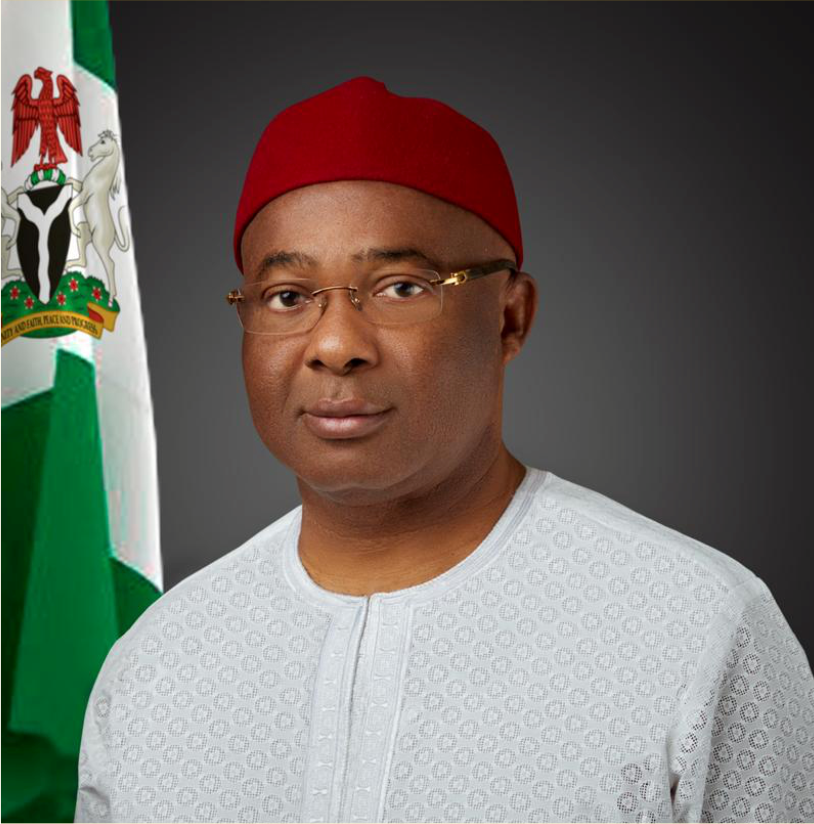
Imo State
Eastern Heartland
Imo State (Igbo: Ȯha Imo) is a state in the South-East geopolitical zone of Nigeria, bordered to the north by Anambra State, Rivers State to the west and south, and Abia State to the east. It takes its name from the Imo River which flows along the state’s eastern border. The state capital is Owerri and the State’s slogan is the “Eastern Heartland.”
Of the 36 States in Nigeria, Imo is the third smallest in area but is fourteenth most populous with an estimated population of over 5.4 million as of 2022. Geographically, the state is divided between the Niger Delta swamp forests in the far east and the drier Cross–Niger transition forests in the rest of the state. Other key geographical features are the state’s rivers and lakes with the Awbana, Imo, Orashi, and Otamiri rivers along with the Oguta Lake in western Imo State.
Modern-day Imo State has been inhabited for almost a thousand years by the Igbo people with the Igbo language serving as a lingua franca alongside English throughout the state. In the pre-colonial period, what is now Imo State was a part of medieval Kingdom of Nri and the later Aro Confederacy before the latter was defeated in the early 1900s by British troop then the Anglo-Aro War. After the war, the British incorporated the area into the Southern Nigeria Protectorate which later merged into British Nigeria in 1914; after the merger, Imo became a centre of anti-colonial resistance during the Women’s War.
After independence in 1960, the area of the present-day Imo was a part of the post-independence Eastern Region until 1967 when the region was split and the area became part of the East Central State. Less than two months afterwards, the former Eastern Region attempted to secede in the three-year long Nigerian Civil War with Imo as a part of the secessionist, Igbo nationalist state of Biafra. The area was hard fought over throughout the war with Owerri and its surrounding area exchanging hands twice before Owerri was named the Biafran capital in 1969. The present-day Imo State was captured by federal forces in early 1970 with Operation Tail-Wind taking the city and ending the war. At the war’s end and the reunification of Nigeria, the East Central State was reformed until 1976 when Imo State was formed by the Murtala Muhammed regime. Fifteen years afterwards, Imo State was divided with eastern Imo being broken off to form the new Abia State.
The state economy is highly dependent on agricultural production, especially the production of palm oil, which a majority of citizens rely on for cooking. A key minor industry is the extraction of crude oil and natural gas, especially in Imo’s north and west. The state has been beset by violence at various points throughout its history, most notably the anti-cult 1996 Otokoto Riots and the ongoing separatist violence from the Eastern Security Network along with other opportunistic nativist gunmen. Despite unrest, with its fast-growing population and industrialization, Imo State has the joint-sixth highest Human Development Index in the country.
Know Your Language
Click Here To Delve Into The Igbo Learning Experience
The Economy
The state is rich in natural resources including crude oil, natural gas, lead and zinc. Economically exploitable flora including iroko, mahogany, obeche, bamboo, rubber tree and oil palm predominate. Other natural resources found in the State are white clay, fine sand and limestone.
There are over 163 oil wells at over 12 different locations in the State. The main petroleum companies operating in the state are Addax Petroleum, Chevron Corporation, Royal Dutch Shell and Agip. Some of the established oil-rich and producing Local Government Councils include Ohaji/Egbema, Oguta, Oru East, Iho, Oru West, Obowo and Ngor Okpala.
Many trade and investment opportunities abound in the peaceful State including Oil and Gas Exploration, Chemical Plants, Brewery Plants, Hydroelectricity and Gas-Fired Power Plants, Grain Milling, Starch Production, Cashew Product Industry, Fruit and Vegetable Juice Concentrate Production, Integrated Multi-Oil Seeds Processing Plant, Ceramic Industry, Inland Waterway Transport, Integrated Palm Produce Industry et al. In addition to presence of oil and gas investors, independent global brewer, Heineken through its subsidiary Nigerian Breweries has significant investment in Imo State. The company manages the world-class Awo-omamma Brewery, a multiple-line brewery plant.
Many more opportunities in oil and gas are yet to be fully exploited. The Federal Government has been called to inspect newly discovered oil-rich council areas for possible exploration in order to increase the presence of the federal government in the State and the region, which would enable economic development and job creation. Establishment of industrial parks and processing zones to harness the huge agricultural produce and minerals would give a major boost to the State’s economic growth and industrialization. No doubt, production centers would employ large number of labor.
Oguta Lake, Palm Beach Holiday Resort in Awo-omamma and a host of other tourist sites along the banks of the 26 km-length Njaba River present hotspots for tourism. The economy of the State depends primarily on agriculture and commerce. The chief occupation of the people is farming. However, with a high population density and over farming the soil has been degraded and much of the native vegetation has disappeared. Their cash crops include oil palm, raffia palm, rice, groundnut, melon, cotton, cocoa, rubber, maize, etc. food crops such as yam, cassava, cocoyam and maize are also produced in large quantities
Imo State came into existence in 1976, along with other new states created under the leadership of the late military ruler of Nigeria, Murtala Muhammed, having been previously part of East-Central State. The state is named after the Imo River, which bears the name of a prominent Nigerian family with that family name, who were the chiefs of Imo State before the ratification of a more formal government, Part of it was split off in 1991 as Abia State, and another part became Ebonyi State.
Imo State was created at Ngwoma, and the meetings for the state creation which began after the Nigerian Civil War[52] ended in 1970 were chaired by Eze S. E. Onukogu.
The people of Imo State carried out the Otokoto riots of 1996, which was a statewide protest, in response to the serial kidnappings and murders occurring in Imo at that point in time.[54] One of the most remarkable riots that took place in Imo state, that led to the destruction of properties was the #ENDSARS protest. This protest which started peacefully not only in Imo state, led to riots and destruction of police stations, and killing of security personnel #ENDSARS in Imo State
Imo State consists of 27 local government areas:
- Aboh Mbaise
- Ahiazu Mbaise
- Ehime Mbano
- Ezinihitte Mbaise
- Ideato North
- Ideato South
- Ihitte/Uboma
- Ikeduru
- Isiala Mbano
- Isu
- Mbaitoli
- Ngor Okpala
- Njaba
- Nkwerre
- Nwangele
- Obowo
- Oguta
- Ohaji/Egbema
- Okigwe
- Onuimo
- Orlu
- Orsu
- Oru East
- Oru West
- Owerri Municipal
- Owerri North
- Owerri West
Smaller jurisdictions in the state may receive township status or urban status.
Imo State is bordered by Abia State on the East, River Niger and Delta State to the West, Anambra State on the North and Rivers State to the South.[3] The State lies within latitudes 4°45’N and 7°15’N, and longitude 6°50’E and 7°25’E with an area of around 5,100 sq km.[4] Besides Owerri, Imo State’s major towns are Isu, Okigwe, Oguta, Orlu,Atta Ikeduru, Akokwa, Mbaise, Mbaitoli, Mbieri, Ohaji/Egbema, Orodo, Nkwerre, Ubulu, Ngor Okpala, Omuma, Mgbidi, Awo-Omamma, Izombe, Orsu, and Mbano.
The Orashi River has its source in Imo State. Imo River, being the major river in the State, drains through Abia State, where it is joined by Aba River from the North, and Akwa Ibom State into the Atlantic Ocean. There are Njaba River, Oguta Lake, Utu River and Awbana River in the State.[5] Otamiri River and its 9.2 km length tributary, Nworie River flow in the State.There are other rivers and creeks in the state including Onas Creek in Ohaji/Egbema, Okitankwo River in Umudi, and Ohia and Efuru Rivers in Okigwe.
The state is over 4.8 million people and the population density varies from 230–1,400 people per square kilometre. Christianity is the predominant religion. In addition to English being official language, Imo state is a predominantly Igbo speaking state, with Igbo people constituting a majority of 98%.
The state government is led by a democratically elected governor who works closely with members of the state’s house of assembly. The Capital city of the State is Owerri
Electoral system
The electoral system of each state is selected using a modified two-round system. To be elected in the first round, a candidate must receive the plurality of the vote and over 25% of the vote in at least two-thirds of the State Local Government Areas. If no candidate passes this threshold, a second round will be held between the top candidate and the next candidate to have received a plurality of votes in the highest number of Local Government Areas
There are over 163 oil wells, at over 12 different locations in the State. The main petroleum companies operating in the State are Addax Petroleum, Chevron Corporation, Royal Dutch Shell and Agip. Some of the established oil-rich local government councils include: Ohaji/Egbema, Oguta, Oru East, Iho, Oru West, Obowo and Ngor Okpala. In recent times, indigenes of Ohaji/Egbema communities have been protesting about poor basic amenities in their host community despite the presence of oil producing companies.
There are several institutions of higher learning including state and federal government run institutions.
This is a list of the higher institutions located in Imo State:
- Alvan Ikoku Federal College of Education
- Federal Polytechnic, Nekede
- Federal University of Technology Owerri
- Hezekiah University, Umudi
- Imo State Polytechnic, Umuagwo
- Imo State University, Owerri
- Kingsley Ozumba Mbadiwe University, Ogboko, Ideato
Many investment opportunities exist in the State including oil and gas exploration, chemical plants, brewery plants, hydroelectric plants, gas-fired power plants, grain mills, starch production, cashews, fruit and vegetable juice concentrate production, integrated multi-oil seed processing plants, ceramics, inland waterway transport, and palm produce industry.
Independent global brewer Heineken, through its subsidiary Nigerian Breweries, has significant investment in Imo State. The company manages the world-class Awo-omamma Brewery, a multiple-line plant
Many more oil and gas opportunities are yet to be developed. The federal government has been called to inspect newly discovered oil-rich areas, which might help foster economic development and job creation.
Industrial parks and processing zones to harness the huge agricultural produce and minerals would give a major boost to the state’s economic growth and industrialization.
Oguta Lake, Palm Beach Holiday Resort in Awo-omamma , and a host of other tourist sites along the banks of the 26 km-length Njaba River present hotspots for tourism.
The state has several natural resources which includes, crude oil, natural gas, lead, calcium carbonate, solar and wind power, zinc.
Profitable flora including iroko, mahogany, obeche, bamboo, rubber tree and oil palm. Additionally white clay, fine sand and limestone are also found in the state.
Agriculture is the primary occupation, but due to over-farming and high population density, the soil has greatly degraded.This could be as a result of inefficient production techniques, poor resource base, declining soil productivity, predominance of primitive techniques of agricultural production, inadequate supply of credit, low capital investment, use of crude implements to mention but a few. The Agricultural sector in Imo State, needs the intervention of the state government and other huge private companies, this is because having a strong economy based on crude oil, natural gas and palm oil will not aid for the development of the state.
The State has a three-tier administrative structure: State, Local and Autonomous community levels. The three arms at state level are the Executive, the Legislative and the Judiciary. The executive arm is headed by an elected Governor, who is assisted by a deputy governor, commissioners and executive advisers.
This is a list of administrators and governors of Imo State since its creation.
- Ndubuisi Kanu – Governor – March 1976- 1977- (Military)
- Adekunle Lawal- Governor – 1977- July 1978 (Military)
- Sunday Ajibade Adenihun – Governor- July 1978- October 1979 (Military)
- Samuel Onunaka Mbakwe – Governor – 1 October 1979 – 31 Dec 1983 (NPP)
- Ike Nwachukwu – Governor- January 1984 – August 1985 (Military)
- Allison Amakoduna Madueke -Governor -August 1985 – 1986 (Military)
- Amadi Ikechegh – Governor – 1986 – 1990 (Military)
- Anthony E. Oguguo – Governor – August 1990 – January 1992- (Military)
- Evan Enwerem – Governor – January – 1992 – November – 1993 NRC
- James N.J. Aneke – Administrator – 9 December 1993 – 22 August 1996 (Military)
- Tanko Zubairu – Administrator – 22 August – 1996 – May 1999 (Military)
- Achike Udenwa – Governor – 29 May – 1999 29 – May 2007 PDP
- Ikedi G. Ohakim – Governor – 29 May 2007 – 29 May 2011 – PPA / PDP
- Owelle Rochas Anayo Okorocha – Governor -29 May 2011- 29 May 2019 – APGA/APC
- Emeka Ihedioha – Governor – 29 May- 2019 15 January 2020 PDP
- Hope Uzodinma – Governor -15 Janaury – 2020 – Till date APC
The legislative arm is headed by the Speaker of the State House of Assembly. The current Speaker is Rt. Hon. Chike Olemgbe, and his deputy is Rt. Hon. Amara iwuanyanwu. The remainder of the house is made up of elected legislators, from the 27 LGAs of the State.
At the 10th state house assembly (2023), the current speaker of the Imo State House of Assembly is Hon. Chike Olemgbe. He is a first-time member representing Ihitte/Uboma Local Government Area. Also, the Deputy Speaker of the house is Hon. Amara Iwuanyanwu, who is a member representing the Nwangele constituency.
The judiciary is made up of the high court of justice and the customary court of appeal and is headed by the Chief Judge of the State.
The state has over 5.5 million people, and the population density varies from 230 to 1,400 people per square kilometre. Christianity and Odinani are the majority religions, with Odinani becoming more common as citizens are beginning to embrace their religious heritage.In addition to its capital, other notable towns are Orlu, Obowo, Oguta, Awo-Omamma, Mgbidi, Mbaise, Okigwe and Ohaji/Egbema.
Imo State is a predominantly Igbo-speaking state, with Igbo people constituting a majority of the population (around 98%).
Religion
Majority of Imo State residents are Christians. Catholics (2021) in the Archdiocese of Owerri (1948) with 162 parishes under Archbishop Lucius Iwejuru Ugorji (2022), and two suffragan dioceses of Okigwe (1981) with 119 parishes under Bishop Solomon Amanchukwu Amatu (2006) and Orlu (1980) with 189 parishes under Bishop Augustine Tochukwu Ukwuoma (2008). The Anglican Church of Nigeria includes the Province of Owerri led by Archbishop David Onuoha (2020), also Bishop of Okigwe South, and 10 other Dioceses of Okigwe South (1994) led by Bishop David Onuoha (2004), Owerri led by Bishop Chukwuma Oparah (2018), Orlu led by Bishop Benjamin Chinedum Okeke (2019), Mbaise(1992) led by Bishop Chamberlain Chinedu Ogunedo (2010), Isi Mbano led by Bishop Godson Udochukwu Ukanwa, Ideato(1999) led by Bishop Henry Okeke (2020), Ohaji/Egbema led by Bishop Childi Collins Oparaojiaku (2008), On the Lake led by Bishop Chijioke Oti (2008), Oru led by Bishop Geoffrey Chukwunenye (2008), Okigwe led by Bishop Edward Osuegbu, and Ikeduru led by Bishop Emmanuel Maduwike (2009).
Federal Highways
- A3 north from Umuahia (Abia State) via Umuokwara to Lokpauku, Abia State.
- A6 northwest from Abia State at Umuika via Owerri to Anambra State.
- F106 east from Owerri via Nguru to A3 at Etiti.
Other major roads include
- the Uli-Aguta Rd north to Uli in Anambra State
- the Ihiala-Orlu Rd to Anambra State,
- the Nnewi-Okigwe Rd via Akokwa and Akwa-Okigwe Rd north to Anambra State,
- Okigwe-Afikpo Rd east to Abia State at Okigwe,
- the Umu-Opara Rd from Umoke to Abia State,
- the Umu-Ohie-Uku-Amala-Ibodo Rd southwest from Okpuala via Eziama and Amala to Olakwo in Rivers State,
- the Owerri-Ahoada Rd southwest to Rivers State,
- the Okwuzi-Aguta Rd south to the Ogura-Omoku Rd in Rivers State.
The rainy season begins in April and lasts until October, with annual rainfall varying from 1,500 mm to 2,200 mm (60 to 80 inches).
An average annual temperature above 20 °C (68.0 °F), creates an annual relative humidity of 75%. With humidity reaching 90% in the rainy season. The dry season experiences two months of Harmattan, from late December to late February. The hottest months are between January and March.
With high population density and over farming, the soil has been degraded and much of the native vegetation has disappeared
This deforestation has triggered soil erosion, which is compounded by heavy seasonal rainfall that has led to the destruction of houses and roads.
Sport
- Chioma Ajunwa – 1996 Olympic gold long jumper
- Chidobe Awuzie – cornerback for the Cincinnati Bengals
- Kelechi Iheanacho – striker for Leicester City, U-17 World Cup winner and tournament’s MVP (2013)
- Samuel Okwaraji (1964–1989) – national footballer
- Levi Onwuzurike- defensive tackle for Detroit Lions 2021–present
Arts
- Obianuju Catherine Acholonu – author
- Charly Boy – hip hop singer and activist
- Kanayo O. Kanayo – actor and lawyer
- Osita Iheme – actor and author
- Chidinma – musician and actress
- Snazzy the Optimist – musician
- Jidenna – rapper and singer
- Rita Dominic – Nigerian actress
- Kelechi Eke – Filmmaker and Founder of Village Arts & Film Festival (VILLAFFEST), Owerri
- Prince Eke – Nollywood actor
- Ada Jesus – Nigerian actress and comedienne
- Blaqbonez – Nigerian rapper
- Fave – Nigerian Singer-songwriter
- Illbliss – Nigerian rapper
- John Munonye – author
- Genevieve Nnaji – Nollywood actress
- Alban Uzoma Nwapa – Eurodance musician
- Onyeka Nwelue – author, scholar, actor, entrepreneur
- Christogonus Ezebuiro Obinna – highlife musician
- Onyeka Onwenu – singer, actress and politician
- Victony – Nigerian musician
Politics
- Pats Acholonu – Supreme Court Justice
- Chris Anyanwu – journalist and senator
- Ifeanyi Ararume – former senator of Okigwe zone (1999-2007)
- Martin Agbaso – former senator of Owerri
- Kema Chikwe – former Minister of Aviation
- Sebastian Okechukwu Mezu – Nigerian writer, scholar, philanthropist, publisher, and politician
- Chile Eboe-Osuji – Judge, International Court of Criminal Justice, Hague
- Evan Enwerem – former governor and former President of the Senate
- Bede Eke – politician
- Emeka Ihedioha – former Governor and Chief whip Nigeria House of Representatives
- Maurice Iwu – former INEC chairman
- Emmanuel Iwuanyanwu – politician and businessman
- Prince Eze Madumere – former Deputy Governor
- K. O. Mbadiwe – former Minister of Commerce and Industry
- Sam Mbakwe – former Governor
- Henry Nwawuba – Politician and Entrepreneur
- Raymond Njoku – former Minister of Transportation
- Chukwuemeka Nwajiuba – former House of Representatives Member and current Minister of the Federal Republic Of Nigeria
- Arthur Nzeribe – former Senator Orlu Zone, Member of the Senate of Nigeria in the 4th National Assembly (1999-2003)
- Walter Ofonagoro – former Minister of Information and Culture
- Ikedi Ohakim – former governor
- Chris Okewulonu – Chief of Staff
- Rochas Okorocha – former governor and a serving senator representing Imo West, under investigation as of May 2022
- Fabian Osuji – former Minister of Education
- Ugonna Ozurigbo – Deputy Speaker, Imo State House of Assembly (2015–), and Member
- Achike Udenwa – former Governor
- Hope Uzodinma – Governor of Imo state
Other
- Jaja of Opobo – first king (amanyanabo) of Opobo.
- Adiele Afigbo – historian
- Victor Adibe Chikwe – Roman Catholic bishop
- Mary Nzimiro – pioneering medical doctor
- Priscilla Nzimiro – medical doctor
- Nelson Enwerem – Mr Nigeria winner (2018)
- Michael Echeruo – academic and writer in Igbo studies
- Ada Ehi — Nigerian gospel musician
- Nenny B – media personality
- Evelyn Okere – Nigerian businesswoman, publisher, fashion designer
- Odumeje — Clergyman.
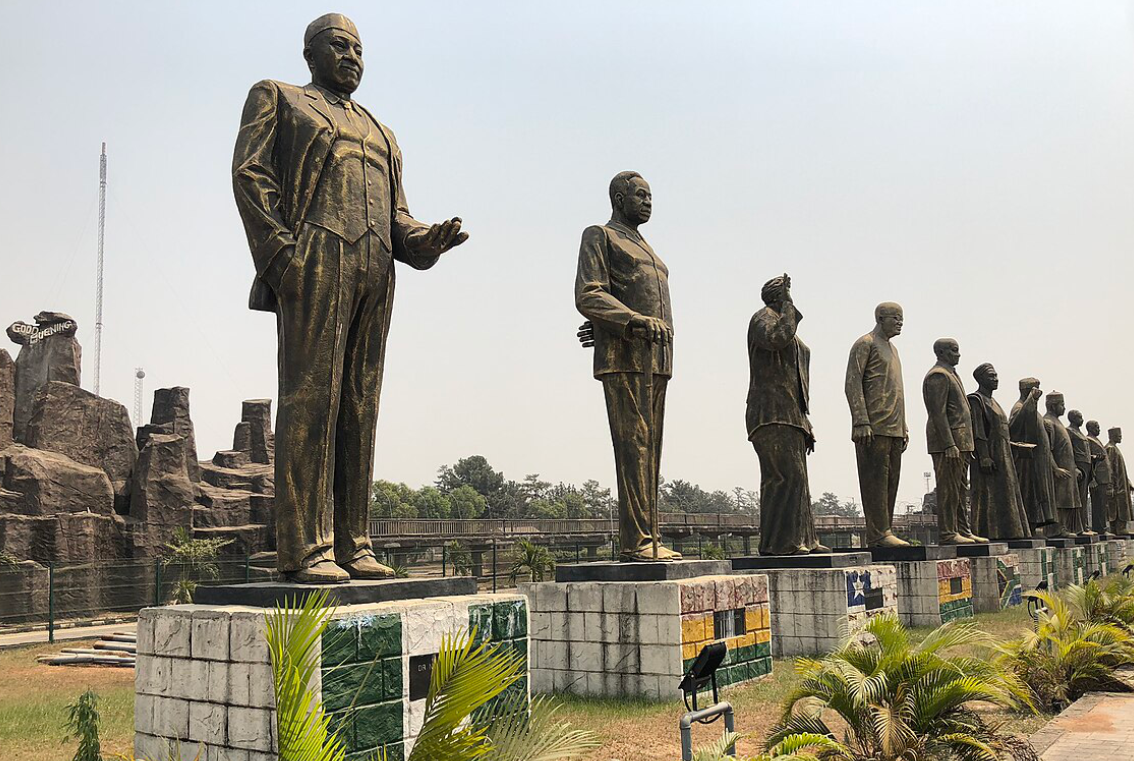
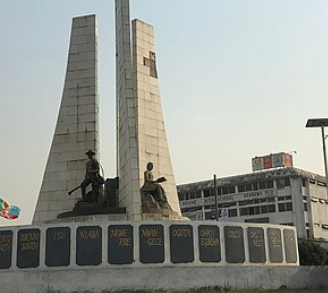
Welcome To Orient Igbo CommunityIgbo Entrepreneurs Igbo Professionals Resourceful Minds
Welcome to our social re-engineering and nationalist platform, dedicated to networking innovative Igbo entrepreneurs, professionals, and politically conscious men and women. Our goal is to build a powerful and influential political and business empire, with significant investments in strategic sectors of the Nigerian economy and polity. Through this initiative, we aim to develop the Igbo community to competes effectively with other tribes and ethnic groups without resorting to violence or any other socially unacceptable methods.
OUR MISSION
To harness the potential of young professionals and entrepreneurs from the southeastern states in fostering unity and development within the society. And to build the Igbo nation into a world tourism hub through the conscious revival and promotion of the rich cultural heritage of the Igbo people of South eastern Nigeria.
OUR VISION
To be a catalyst of development and economic prosperity across the southeastern states, to foster national unity while working as the most powerful platform for the socio-political emancipation and empowerment of Igbos anywhere in the World by building a powerful network of innovative Igbo professionals and entrepreneurs for the overall interest of the Igbo ethnic nation.
OUR VALUE
O-Originality
R -Resourceful
I -integrity
E-Excellence
N-Networking
T- Team Work
The Southeastern State; We are the MerchantCreativeIndustrious Tribe of the Nation
The South East (often written as South-East) is one of the six geopolitical zones of Nigeria representing both a geographic and political region of the country’s inland southeast. It comprises five states – Abia, Anambra, Ebonyi, Enugu, and Imo.

